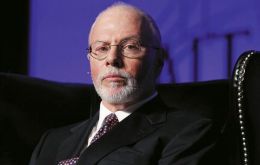MercoPress. South Atlantic News Agency
Economy
-
Thursday, June 26th 2014 - 01:01 UTC
Argentina insists on dialogue but “technical default” is round the corner, Kicillof tells G77

Economy minister Axel Kicillof said US courts haven't yet responded to Argentina's request this week for more time to negotiate a settlement with a small group of holdout creditors and warned the country could face a technical default next Monday if the sentence remains firm.
-
Thursday, June 26th 2014 - 00:14 UTC
Mediator Pollack meets with Argentina and holdouts' solicitors

Mediator Daniel Pollack named by New York Judge Thomas Griesa to try and help reach an understanding in the long running dispute between Argentina and the holdout hedge bond holders, said he had already held meetings with the solicitors from both sides. However he only revealed that discussions will continue until a resolution is reached.
-
Wednesday, June 25th 2014 - 06:46 UTC
Argentina waiting for Judge Griesa's reply on the 'stay' request

The government of President Cristina Fernandez awaits Judge Griesa's decision after the request to issue a stay on the ruling that orders Argentina to pay all the bondholders at the same time, Argentine Cabinet Chief Jorge Capitanich said in his daily press briefing at Government House on Tuesday.
-
Wednesday, June 25th 2014 - 06:22 UTC
Uruguay's second pulp mill begins production: 1.3million tons annually

Uruguay's second pulp mill Montes del Plata started production this week following an investment of 2 billion dollars, the largest ever in the recent history of the country. The announcement was made by the Chilean-Swedish complex that is running the plant.
-
Tuesday, June 24th 2014 - 23:52 UTC
Unasur sides with Argentina and warns about “global financial stability”

The Union of Southern Nations (UNASUR) expressed its solidarity with Argentina after US Supreme Court decision to dismiss the country’s appeal in its legal dispute with holdout hedge funds, rejecting “the behavior of speculative agents that endanger the agreements reached between debtors and creditors”.
-
Tuesday, June 24th 2014 - 23:30 UTC
Argentina's bond fight with holdouts will be addressed by G-77 plus China

Argentina’s bond fight against holdout hedge funds will reach the United Nations headquarters on Wednesday when Economy Minister Axel Kicillof addresses the G77 plus China 134-nations plenary on Argentina's debt restructuring process.
-
Tuesday, June 24th 2014 - 22:37 UTC
Hedge fund calls on Judge Griesa to reject 'stay' order requested by Argentina

Hedge fund NML Capital have dismissed the Argentine government's request to reestablish a stay on payments to the holdout hedge funds, and called on New York judge Thomas Griesa to reject the plea.
-
Tuesday, June 24th 2014 - 06:54 UTC
Griesa appoints mediator for talks between Argentina and holdout hedge funds

New York district court judge Thomas Griesa on Monday appointed a Manhattan attorney to supervise talks between Argentina and hedge fund holdout bondholders after the government of President Cristina Fernandez asked him to organize negotiations with its creditors.
-
Tuesday, June 24th 2014 - 06:42 UTC
Argentina requests a 'stay' order on the ruling favoring holdout creditors

Argentina asked a U.S. judge on Monday to issue a stay of his ruling against the country in its case against “holdout” creditors as it sought to avoid a possible new default. The country is in a 12-year-old legal fight with investors who declined to participate in bond restructurings (2005 and 2010) after the country defaulted on 100 billion dollars in sovereign debt in 2002.
-
Tuesday, June 24th 2014 - 06:27 UTC
Falklands promoted at “Experience Latin America” travel event in London

Representatives from Falkland Islands Holidays and International Tours and Travel travelled to London last week to attend ‘Experience Latin America’. Cathy Jacobsen (ITT) and Jenny Luxton (FIH) were both pleased with the level of interest expressed in the Falklands at the three day trade to trade event for the travel industry.
